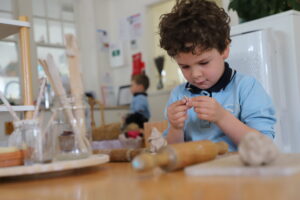The Importance of Resilience

The importance of resilience – eight steps to build resilience in young children.
 All children inevitably encounter obstacles and difficulties as part of their daily lives. Resilience refers to the remarkable ability to bounce back when faced with such challenges or setbacks.
All children inevitably encounter obstacles and difficulties as part of their daily lives. Resilience refers to the remarkable ability to bounce back when faced with such challenges or setbacks.
Instilling resilience in children from an early age is crucial. Resilience boosts children’s confidence and equips them for future encounters with adversity. As young children accumulate experiences over time, they gradually develop resilience.
“Building resilience helps children not only to deal with current difficulties that are part of everyday life, but also develop the basic skills and habits that will help them deal with challenges later in life, during adolescence and adulthood.” Beyond Blue
When things don’t go as planned, children often experience a range of emotions, such as anxiety, sadness, disappointment, anger, or frustration. Resilience comes into play by helping them understand that these emotions are temporary and can be worked through.
Crucially, relationships play a vital role in fostering resilience. Establishing strong, positive connections with family members and educators provides children with a sense of safety, security, and love. This secure foundation enables children to explore the world around them confidently and recover from setbacks with greater ease.
 Resilience is learned through experience. Every time children successfully overcome a problem, their confidence and ability to manage the next challenge grows. Resilient children demonstrate a willingness to try again, even if things don’t unfold as expected. They possess the confidence and problem-solving skills necessary to navigate a diverse range of situations.
Resilience is learned through experience. Every time children successfully overcome a problem, their confidence and ability to manage the next challenge grows. Resilient children demonstrate a willingness to try again, even if things don’t unfold as expected. They possess the confidence and problem-solving skills necessary to navigate a diverse range of situations.
The Importance of Resilience – eight steps to build resilience in young children
- Encourage Independence – give your child time and space to solve problems for themselves. Avoid predicting and preventing problems for your child as you will be denying them the opportunity to learn and grow. Ask questions and bounce the problem back to the child, then brainstorm solutions together. Children will demonstrate how competent and capable they can be when given the opportunity.
- Identify, Acknowledge and Manage Emotions – help your child to identify and manage their emotions. Talk to them about how they are feeling and acknowledge those feelings. For example, “It’s okay to be feeling sad because we can’t visit Grandma at the moment. What could you do to tell Grandma how much you miss her?”
- Promote a ‘Can Do’ Attitude – encourage your child to have a go or try again when they think they can’t do something or when things don’t work out the first time. We need to promote the importance of trying or “having a go” and acknowledge the child’s efforts.
- Embrace Mistakes – It is important that children understand that it is okay to make mistakes and that this is how we learn and grow. This should be modelled and promoted with young children. Our aim is to promote a growth mindset.
- Promote Healthy Risk Taking – It’s important for young children to experience a healthy level of risk. They need to experience what it feels like to step outside of their comfort zone. This might include trying an activity or skill that they have not previously tried, interacting with new people, or trying out new play equipment at the playground.
- Promote Optimism – Optimism and resiliency go hand in hand. Optimism can be nurtured in young children. Your conversations and questions can help support the child to see the positive in situations rather than them becoming fixated on the negative.
- Encourage Problem Solving Skills – if your child talks to you about an issue that has occurred during their day, rather than giving them solutions, ask them what they could do or who they could talk to about this problem if they encounter the same thing again. By doing this, you are providing the child with strategies and a plan for how to handle a similar situation.
- Role Model Resilience – role model how you respond to challenges. When your child sees you adapt because something doesn’t go to plan, or let frustration go, or display a positive attitude in a challenging situation, they learn that they can do the same.
 These are some of the strategies that educators use in our Early Learning Programs to support the development of resilience in our ELC children. By working together, families and educators can best support the building of resilience in our children and ensure they are well-prepared for the many challenges they will face in their everyday lives.
These are some of the strategies that educators use in our Early Learning Programs to support the development of resilience in our ELC children. By working together, families and educators can best support the building of resilience in our children and ensure they are well-prepared for the many challenges they will face in their everyday lives.





